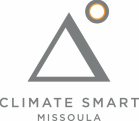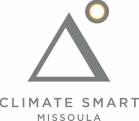|
April was Earth Month - and it was a busy one! We kicked it off with a great conversation as usual at our monthly meetup, on the topic of Local Food & Agriculture. Just in time for the beginning of outdoor farmers market season! We talked about everything from efforts to protect local farmland via the Missoula Area Mapping project, to the many environmental benefits of mushrooms, to saving seeds and supporting our local farmers. Here's a few links to some of the people, organizations and ideas that were part of the conversation:
We're grateful to be part of a community of locavores who understand and value agriculture and local food as important tools in Missoula's climate resilience toolbox! We hope you also had a chance to take part in some of the great community festivities around Earth Month. From the International Wildlife Film Festival, to MUD's Annual Earth Day Celebration, to celebrating trees and their climate benefits, we had fun out and about in April. Next Monthly Meetup is Health & Climate - hope you'll join us on Thursday, May 9!
1 Comment
On May 5th, Missoula community members gathered to learn and talk about local food and agriculture and climate change. Kim Gilchrist with the Community Food and Agriculture Coalition (CFAC) started us off with an overview of the food system, tracing the steps that get our food from farm to fork. She described the work that CFAC is doing to support farmers and farmland and improve access to local food for all members of our community, including the Double Snap Dollars program. Greg Price of Garden City Harvest described the climate change impacts he’s observed in his 15 years of experience as the manager of River Road Neighborhood Farm. Greg explained that climate change has brought tradeoffs between a longer growing season on one hand, and more extreme heat and less water for irrigation on the other. Caroline Stephens, produce manager at Foothill Farm, also shared about her graduate research interviewing Montana farmers about drought and climate change.
Missoula is known for its vibrant local food scene, with farmers’ markets buzzing on Saturday mornings, restaurants featuring local produce, and thriving community gardens. For many Missoulians, our local food culture is part of what makes Missoula a great place to live. But the abundance and diversity of local food and sustainable agriculture also increases our community’s resilience to climate change. When we produce more of our food nearby, we are less dependent on global and national supply chains that are vulnerable to climate impacts, and we strengthen our local economy. Food hubs, such as the Western Montana Growers’ Co-op, aggregate produce from many farms and distribute it to grocery stores and institutions like schools and hospitals, and help connect small farmers with more diverse markets. And when local sustainable agriculture is combined with efforts to reduce food waste, we shrink the carbon footprint of our entire food system, making our community healthier and more sustainable in the long run. Interested in learning more about how Climate Smart Missoula and community partners are working on this issue? Check out our Local Food and Agriculture bucket. |
AuthorsAbby Huseth Archives
July 2024
Categories
All
|

 RSS Feed
RSS Feed


